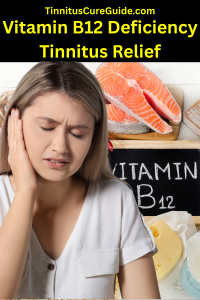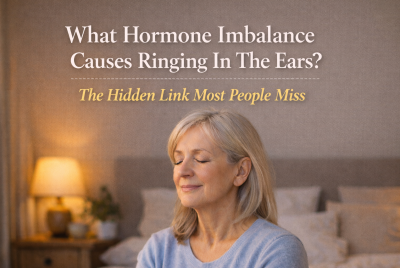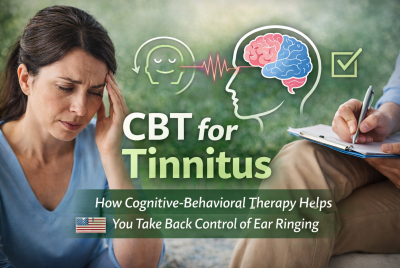Vitamin B12 Deficiency Tinnitus Relief: Can B12 Improve Ringing in Ears?
The Overlooked Link Between B12 and Ear Ringing
If you’ve ever struggled with ringing in the ears, buzzing, or whooshing sounds that just won’t go away, you’re not alone. Millions of Americans experience tinnitus daily, and while noise exposure and aging are common causes, a vitamin B12 deficiency is often overlooked. Research shows that low B12 levels may contribute to ear buzzing sound, high-pitched ear noise, and even hearing loss. This raises an important question: Can correcting a deficiency provide tinnitus relief? In this article, we’ll explore the science behind vitamin B12 deficiency tinnitus relief, natural food sources, supplements, injections, lifestyle tips, and when to seek medical care.
What Is Vitamin B12 and Why Does It Matter for Hearing?
Vitamin B12 (cobalamin) is an essential nutrient that supports:
-
Healthy nerve function
-
Red blood cell formation
-
DNA synthesis
-
Brain and memory health
Because tinnitus often involves nerve-related issues, low B12 levels can make ear ringing worse. Nerves in the auditory pathway may misfire when deprived of this vital vitamin, creating phantom sounds like buzzing or whooshing in ears.
Does Vitamin B12 Deficiency Cause Ear Ringing?
Studies suggest a strong connection between B12 deficiency and tinnitus. In fact, research published in Noise & Health found that many tinnitus patients had lower B12 levels than non-sufferers.
How Deficiency May Trigger Ear Noise:
-
Nerve Damage: Without enough B12, myelin (the protective coating around nerves) weakens, disrupting auditory signals.
-
Poor Circulation: B12 deficiency may reduce oxygen delivery to inner ear structures, worsening ear buzzing sound.
-
Hearing Loss: Since hearing loss often worsens tinnitus, B12 deficiency-related nerve damage can amplify the ringing.
👉 While not all tinnitus cases are linked to B12, addressing a deficiency may bring noticeable relief.
Vitamin B12 Deficiency Tinnitus Relief: Treatment Options
When deficiency is confirmed through blood tests, treatment may improve both energy levels and constant ear ringing symptoms.
1. B12 Injections for Tinnitus Relief in Deficient Patients
Doctors often recommend injections for those with severe deficiency or absorption issues. In some studies, B12 shots reduced tinnitus intensity, especially in younger patients.
2. B12 Supplements for Daily Support
Over-the-counter B12 tablets, sublingual drops, or sprays are popular for maintaining healthy levels. Some tinnitus sufferers report fewer flare-ups after consistent supplementation.
3. B12 vs. Other B Vitamins for Ear Buzzing Sound
While B12 is key, B6 and folate (B9) also support nerve health. A balanced B-complex vitamin may provide broader protection for auditory nerves.
4. B12 and Hearing Aids Tinnitus Improvement
Some U.S. hearing clinics combine B12 supplementation with hearing aids or tinnitus masking devices for a more comprehensive approach.
Foods High in B12 to Reduce Constant Ear Ringing
If you prefer natural tinnitus treatment, focus on foods rich in B12.
Top B12-Rich Foods:
-
Animal Sources: Beef liver, salmon, tuna, clams, eggs, chicken, and dairy products
-
Fortified Foods: Many U.S. cereals, plant-based milks, and nutritional yeasts contain added B12
-
Supplements for Vegans: Since plant foods don’t naturally contain B12, supplements are often essential
👉 Eating a balanced diet with B12-rich foods may not cure tinnitus, but it can reduce symptoms linked to deficiency.
How Much B12 Is Needed to Stop High-Pitched Ear Noise?
The U.S. Recommended Dietary Allowance (RDA) for vitamin B12 is:
-
2.4 mcg/day for most adults
-
2.6–2.8 mcg/day during pregnancy and breastfeeding
-
Higher doses may be needed for people with absorption issues or chronic deficiency
Since B12 is water-soluble, high doses are generally safe, but medical supervision is recommended when using injections or high-potency supplements for tinnitus remedies.
Can Treating B12 Deficiency Reduce Whooshing in Ears?
Yes, in some cases. Many people with vitamin B12 deficiency experience tinnitus symptoms like ringing, buzzing, or even a whooshing sound in the ears. This happens because low B12 levels can affect nerve function and blood flow in the auditory system. Treating the deficiency through supplements, injections, or B12-rich foods may help restore nerve health and improve circulation, potentially reducing or easing whooshing in ears. While not everyone experiences full relief, studies suggest that correcting B12 deficiency can lessen tinnitus severity in some patients. Always consult a healthcare professional before starting supplementation for tinnitus management.
Lifestyle Tips to Maximize B12 Benefits for Tinnitus Relief
To get the most from vitamin B12 deficiency tinnitus relief, combine supplements or diet with these daily habits:
-
Eat B12-rich foods – Salmon, tuna, beef, dairy, and fortified cereals.
-
Stay hydrated – 6–8 glasses of water daily to prevent worsening ear buzzing.
-
Avoid alcohol & smoking – Both reduce B12 absorption and may worsen constant ear ringing.
-
Pair B12 with other nutrients – Folate, B6, and magnesium support nerve and hearing health.
-
Manage stress – Try yoga, meditation, or deep breathing to ease tinnitus perception.
-
Prioritize quality sleep – Consistent rest helps auditory nerves repair.
-
Track progress – Keep a journal of diet, B12 intake, and tinnitus symptom changes.
These lifestyle strategies help maximize the benefits of B12 and support overall ear and nervous system health.
When to See a Doctor
While supplements and dietary changes can help, tinnitus should not be ignored. Seek medical advice if:
-
Ringing or buzzing started suddenly after loud noise exposure
-
You notice hearing loss in one or both ears
-
Tinnitus is accompanied by dizziness, balance issues, or severe headaches
-
You suspect a vitamin B12 deficiency due to fatigue, numbness, or memory problems
-
Home remedies haven’t reduced ear ringing after several weeks
A healthcare professional can run tests, rule out serious conditions, and recommend safe tinnitus remedies and medical treatments.
FAQs About Vitamin B12 Deficiency Tinnitus Relief
1. Does vitamin B12 deficiency cause ear ringing?
Yes, a vitamin B12 deficiency may contribute to tinnitus because low B12 levels affect nerve health and blood flow to the inner ear. Restoring B12 through diet or supplements can sometimes reduce ear ringing symptoms.
2. Can B12 injections help with tinnitus relief?
For people with severe deficiencies, B12 injections can quickly restore levels and improve nerve function. Some studies suggest that injections may reduce the ear buzzing sound in certain patients, especially when a deficiency is a confirmed cause of tinnitus.
3. What foods are high in B12 to reduce ear ringing?
B12-rich foods include beef, salmon, tuna, dairy products, eggs, and fortified cereals. Adding these foods into your daily diet may improve nerve health and support tinnitus relief naturally without always relying on supplements.
4. How much B12 should I take to stop high-pitched ear noise?
Daily B12 needs vary by age and health. Most adults need 2.4 mcg daily, but higher doses may be recommended if deficient. Always consult a doctor before starting supplements for tinnitus relief.
5. Can treating B12 deficiency reduce whooshing in the ears?
Yes, in some cases. Low B12 can impair blood flow and nerve signaling, which may contribute to pulsatile tinnitus or whooshing sounds. Correcting the deficiency may help reduce symptoms, though results differ by individual.
6. Is B12 better than other vitamins for tinnitus relief?
B12 supports nerve repair, but other B vitamins like folate and B6 also help with auditory health. A balanced intake of B-complex vitamins, alongside magnesium and zinc, often provides better tinnitus management than B12 alone.
7. How long does it take for B12 to improve tinnitus symptoms?
Improvement depends on the severity of the deficiency and the consistency of treatment. Some people notice reduced ear ringing within weeks of supplementation, while others may take several months. Tracking symptoms helps measure progress.
Conclusion: Taking Action for Vitamin B12 Deficiency Tinnitus Relief
If you’ve wondered whether vitamin B12 deficiency could be making your tinnitus worse, the answer is yes—it may play a major role. Correcting deficiency through diet, supplements, or injections has helped many sufferers reduce ringing, buzzing, or whooshing in the ears.
While not a guaranteed cure, ensuring healthy B12 levels gives your auditory system the best support for long-term relief. Combine this with sound therapy, hearing aids, and lifestyle changes for the best outcome.
👉 Take control of your tinnitus today by asking your doctor about vitamin B12 testing and supplementation options. Relief may be closer than you think.
Disclaimer
This article is for educational purposes only and should not replace professional medical advice. Always consult a healthcare provider before starting new supplements, treatments, or tinnitus remedies.

- Natural Remedies for Ear Ringing
- GABA Supplement for Tinnitus Relief
- Neck Tightness Causing Ear Ringing





